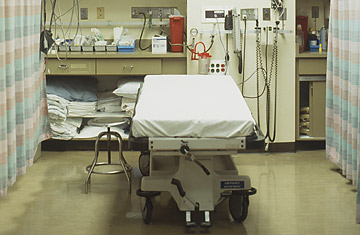
A hospital ward in Britain
(2 of 2)
Is it true that NHS bureaucrats put a price tag on life?
The short answer is yes. The NHS has a body called the National Institute for Health and Clinical Excellence (NICE) that decides which new treatments and drugs the NHS should pay for. One of the factors NICE considers when deciding whether to approve funding for a new treatment or drug is cost-effectiveness. To determine the dividing line between what is cost-effective and what isn't, it must set a threshold. Taking its lead from Britain's Department of Transport — which has a cost-per-life-saved threshold for new road schemes of about $2.2 million per life, or about $45,000 per life year gained — NICE rarely approves a drug or treatment that costs more than $45,000 per life year gained. In short, NICE does not want the NHS to spend more than $45,000 to extend a citizen's life by one year.
While NICE's decisions have angered some doctors and patient groups — particularly some oncologists who say they are unable to prescribe expensive, life-extending cancer drugs — mainstream politicians, the media and most Britons accept NICE's rare rejections as a necessary compromise to keep universal coverage affordable in the face of rising health-care costs. As NICE chairman Sir Michael Rawlins recently told TIME, "All health-care systems have implicitly, if not explicitly, adopted some form of cost control. In the U.S., you do it by not providing health care to some people. That's a rather brutal way of doing it."
Is it true that old people receive inferior care on the basis of their age?
NICE uses what it calls "citizens councils" to help it sort through difficult ethical issues, and one of the decisions the councils have made is that age should not be a factor in the institute's approval process — that is to say, a year of life should be considered as valuable to a 77-year-old as to a 12-year-old. In every part of the system, a 77-year-old has the same access to treatment as anyone else in Britain.
What about the ad by lobby group CPR that interviews a British woman who developed cervical cancer after being refused a Pap test because she was too young, and another for a woman whose mother died while waiting for treatment for kidney cancer? Are these experiences typical?
As mentioned above, cancer treatment is one area in which British patients probably receive inferior treatment to Americans who have comprehensive health insurance. However, Britain's policy of beginning cervical-cancer screening at age 25 is in accordance with WHO guidelines, which are based on evidence that screening below that age produces false-positive results that can lead to unnecessary and dangerous surgical interventions. Overall, the WHO has found that the risks posed by false positives outweigh the benefits of earlier screening.
It's also true that Americans who have comprehensive health-insurance plans do, in some cases, have access to a greater range of cancer treatments, without waiting lists. The two British women used in the CPR ads have since told various newspapers that their views were inaccurately portrayed. While both have complaints about how cancer is treated within the NHS, they support the service as an institution. The woman who developed cervical cancer (it is now in remission) told the Times of London, "My point was not that the NHS shouldn't exist or that it was a bad thing."
That view seems typical. It's a British pastime to complain bitterly about the NHS but remain fiercely protective of its existence. A recent "We Love the NHS" Twitter campaign has received thousands of messages of support, including from British Prime Minister Gordon Brown, whose eyesight was saved by British doctors after he was involved in a rugby collision as a young man and whose son suffers from cystic fibrosis. The leader of Britain's right-wing Conservative Party, David Cameron, expressed his support for the health service on Aug. 14: "One of the wonderful things about living in this country is that the moment you're injured or fall ill — no matter who you are, where you are from or how much money you've got — you know that the NHS will look after you."
